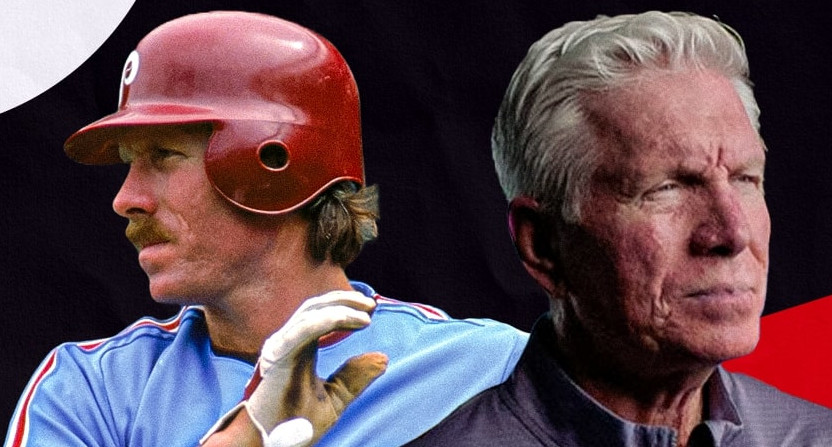Any sports Mount Rushmore of Philadelphia athletes must include Mike Schmidt. He’s not only the greatest Phillie of all time. He is the greatest third baseman of all time, excelling at the plate and in the field.
You would think someone like that would have been universally beloved during his playing days in a passionate place like Philadelphia. However, that was not the case. At best, Schmidt’s relationship was complicated. Older sports fans know this. Younger ones might not be fully aware. The MLB Network Presents documentary Michael Jack Schmidt illuminates one of the more fascinating connections between a city and its biggest star. It will debut Dec. 12 at 8 p.m. ET on MLB Network.
One thing is clear. The bond between Schmidt and Philadelphia is much better today. The wounds have healed. Angry words have been either forgiven or forgotten. He’s also 75, having last put on a uniform in 1989. Time has a way of easing tensions and bitterness. In Michael Jack Schmidt expresses regret about how he handled things. And perhaps, if Schmidt were in his prime today, he would have been more appreciated.
No third baseman has hit more home runs. No Hall of Famer has been booed by his hometown fans quite like him. Even during his speech at Cooperstown, he was concerned about being jeered after making some ill-advised comments. It’s a unique relationship that’s sometimes difficult to understand.
Philadelphia is a pro sports town, unlike any other city, except for Boston. The fans have their entire identity wrapped up in their teams. They care—and they care to a degree that others would find not only irrational but sometimes disturbing. Weirdly, Schmidt simultaneously was a symbol of excellence and an avatar for frustration whenever the franchise didn’t meet expectations.
In Michael Jack Schmidt, Charles Barkley, who had similar struggles as a Philadelphia 76er long before becoming an adored TV personality, summed it up best: “Philly is a great sports town, but when things are not going good, it’s not a lot of fun.”
Barkley, Julius “Dr. J” Erving, and Doug Collins are all featured in this documentary because they could all relate to what Schmidt was going through. They give perspective and context to the pressures of living in a demanding sports city. As great as you are, sometimes it’s not enough.
Schmidt’s origin story should have been easy to embrace. Casual baseball fans might be surprised to learn that he went to college with dreams of becoming an architect and was a walk-on for Ohio University’s baseball team. As a second-round draft choice in 1971 by the Phillies, he wasn’t projected to be a star.
Schmidt grew up into a 12-time All-Star who stayed in Philadelphia for the duration of his 18-year career. He won three National League MVPs and helped the franchise to its first World Series championships in 1980. That ought to mean something. But when the Phillies or Schmidt struggled, the boos came fast and furious, even after winning it all. Philadelphia fans like their athletes to express emotion publicly. That wasn’t necessarily his personality. He was not Jason Kelce. He wasn’t Pete Rose. Michael Jack Schmidt prompts the question: What exactly do athletes owe their fans?
Sure, at times he was unfairly criticized. Sure, Schmidt sometimes said things he later regretted. The documentary is told mostly through Schmidt’s prism, including supporting interviews from fellow players and some media members, most notably longtime Philadelphia Inquirer columnist Jayson Stark. It would have been helpful to include feedback from fans in the documentary.
The biggest takeaway from Michael Jack Schmidt, is seeing the steps Schmidt took to heal the relationship. However, the dysfunction in that relationship made his story even more memorable.
Michael Jack Schmidt debuts on Dec. 12 at 8 p.m. ET on MLB Network.
